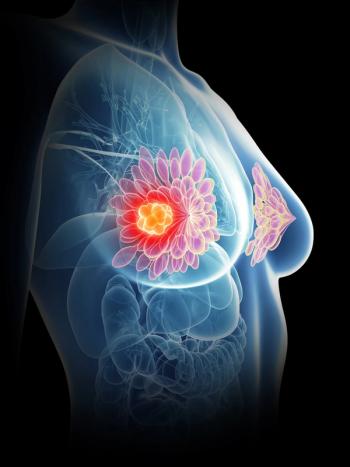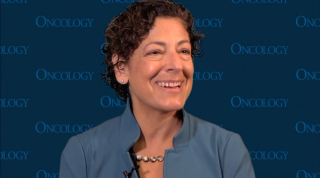
Breast Cancer
Latest News

Latest Videos

CME Content
More News

An expert from Dana-Farber Cancer Institute describes which patients hormone receptor-positive, HER2-negative breast cancer will benefit most from treatment with sacituzumab govitecan.

An expert from Dana-Farber Cancer Institute highlights the unmet needs that sacituzumab govitecan meets in the treatment of advanced hormone receptor-positive, HER2-negative breast cancer.

An expert from Dana-Farber Cancer Institute highlights data that supported the FDA’s approval of sacituzumab govitecan for advanced hormone receptor–positive, HER2-negative breast cancer.

The 10-year cumulative local recurrence rate in patients with early breast cancer receiving accelerated partial breast irradiation with multi-catheter brachytherapy does not significantly differ from those receiving whole-breast irradiation following breast-conserving surgery.

Experts review the most recent data and discuss current strategies for the management of HR+ metastatic breast cancer.

Overall survival after 10 years appears to be comparable regardless of whether patients 65 years or older received irradiation following surgery for low-risk, hormone receptor–positive breast cancer.

Patritumab deruxtecan continues to yield positive efficacy in 2 early phase trials assessing the agent in patients with metastatic non–small cell lung cancer and breast cancer.

Hope S. Rugo, MD, FASCO, and Paolo Tarantino, MD, offer closing remarks on the growing field of HER2-low and triple-negative breast cancer.

Breast cancer experts talk through their approaches to treating HER2-low triple-negative breast cancer.

Bria-IMT plus retifanlimab continues to show positive clinical outcomes in a small cohort of patients with advanced, metastatic breast cancer, according to data from a phase 1/2 trial.

Experts on breast cancer give an overview to treating PD-L1-positive triple-negative breast cancer.

Hope S. Rugo, MD, FASCO, discusses how BRCA mutations change the treatment approach for triple-negative breast cancer.

The phase 3 TORCHLIGHT study, examining toripalimab and paclitaxel, has become the first study in China to achieve positive outcomes with immunotherapy for triple-negative breast cancer.

Paolo Tarantino, MD, explains his approach to treating patients with triple-negative breast cancer who progress early after completing adjuvant therapy.

An overview of antibody-drug conjugates in the recurrent triple-negative breast cancer treatment landscape, and the ASCENT and DESTINY-Breast04 trials.

Patients with hormone receptor–positive, HER2-negative, node-positive early breast cancer at a high risk of relapse who are eligible for treatment with abemaciclib can be identified via nodal status as well as tumor size and grade.

Expert oncologists discuss treatment options in the setting of recurrent triple-negative breast cancer.

Hope S. Rugo, MD, FASCO, and Paolo Tarantino, MD compare treatment approaches for HER2-low and triple-negative breast cancer.

Minh-Tri Nguyen, MD, spoke with CancerNetwork® about differences between time to treatment, socioeconomic status, and clinical outcomes in rural and urban patients with breast cancer.

Paolo Tarantino, MD, an expert on breast cancer, gives an overview of neoadjuvant treatment options for triple-negative breast cancer.

Breast cancer experts Hope S. Rugo, MD, FASCO, and Paolo Tarantino, MD, present the case of a 52-year-old woman with triple-negative breast cancer and provide their initial thoughts.

Experts discuss updates in HR+ breast cancer, with a focus on treatment options before and after progression and emerging data.

Experts from Emory Winship Cancer Institute discuss how the FDA approval of sacituzumab govitecan will impact the treatment of breast cancer.

An expert from Dana-Farber Cancer Institute discusses what the approval of sacituzumab govitecan means for patients with advanced hormone receptor–positive, HER2-negative breast cancer.

Patients with pre-treated, unresectable locally advanced or metastatic hormone receptor-positive, HER2-negative breast cancer can now receive treatment with sacituzumab govitecan following approval from the FDA.










































